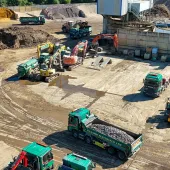Aggregates recycling approaching upper limit

Recovery of construction waste to produce recycled aggregates reaching maximum capacity, says MPA
BRITAIN’s biggest recycling success story is approaching maximum capacity with most reusable materials being put back into use in construction. According to the Mineral Products Association (MPA), the recovery of construction waste to produce recycled aggregates – and the processing of industrial by-products into secondary aggregates – is close to reaching its upper limit.
In a new report based on data from 2020, the MPA estimates that 28% of aggregates for construction come from recycled and secondary sources – some 62 million tonnes in 2020. That means the mineral products industry recycles more than any other sector by volume and places Britain among the leading recyclers of construction materials in Europe.
Recycled aggregates, around 55 million tonnes of which were produced in 2020, come from construction, demolition, and excavation wastes (CDEW) such as crushed concrete and brick, old rail ballast, and material from groundworks.
Secondary aggregates, which accounted for the remaining 7 million tonnes in 2020, are derived from industrial or extractive processes, including the production of china clay, slate, and chalk, plus glass reprocessing, mining spoil, incinerator ash, and slag from iron and steel production.
The MPA report also highlights that newly quarried primary materials – virtually all of which come from UK sources – are still needed to meet the remaining 72% of the total aggregate demand from the construction sector. Even in years when the need for aggregates falls due to a reduction in construction activity, the volume of materials available for recycling also drops proportionally because there is less demolition to give rise to source material.
MPA chief executive Nigel Jackson said: ‘Recycled and secondary aggregates is an outstanding circular economy story that supports and delivers the UK Waste Strategy yet is barely recognized by the Government. When MPA members prepare for a planning application to extract new minerals for the construction industry, they are often faced with the argument that they should be recycling more.
‘The fact is that aggregates producers are already recycling the available materials, and have been for many years, to meet the demand as efficiently and sustainably as possible. It’s therefore important to stress that primary aggregates are still needed to meet around 70% of demand from construction and that situation will continue for the long term.’
Because of the lack of readily available information on recycling of construction materials, to analyse the data the MPA has developed a methodology to track the contribution of recycled and secondary aggregates to overall aggregates supply. The system is based on published statistics from MPA members and other third parties, combined with several tried and tested assumptions.
Aurelie Delannoy, the MPA’s director of economic affairs who authored the report, said: ‘The growing policy focus on the circular economy contrasts with the absence of regular data monitoring on the use of recycled and secondary aggregates, both at national and regional scale. The MPA has developed a methodology to track the contribution of these materials to overall aggregates supply with the aim to fill this gap.’
The MPA says that while many industries are still grappling with the challenges of implementing an effective circular economic model, heavy-side materials producers have become adept at making efficient use of available resources – companies are working to produce recycled and secondary aggregates that meet stringent requirements for use across different construction sectors.
Any materials that cannot be turned into suitable construction aggregate are used in land remediation and quarry restoration schemes, which are widely recognized as uniquely supporting nature recovery and biodiversity net gain (as showcased last year by the MPA in ‘Quarries & Nature… a 50-year success story’).
To view the new MPA recycling report, ‘The Contribution of Recycled and Secondary Materials to Total Aggregates Supply in Great Britain’, click here.









